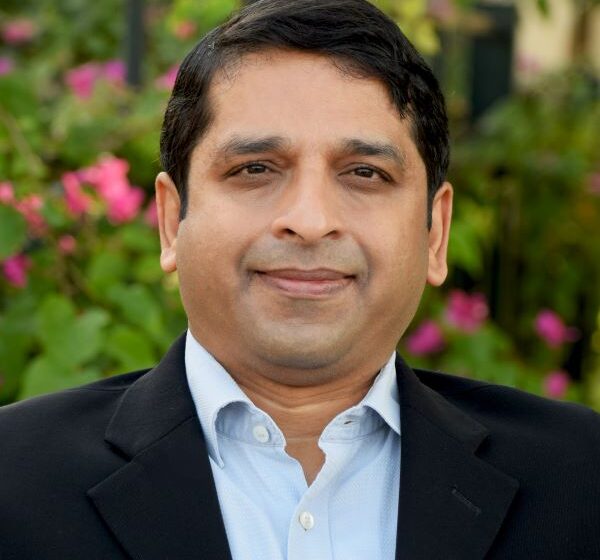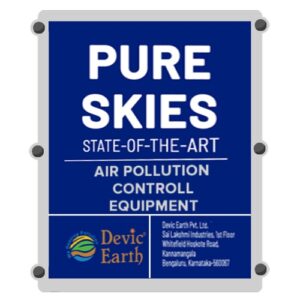From a cardiologist to a clean air crusader, thats Dr Srikanth Sola for you

Dr Srikanth Sola
Rajkumari Sharma Tankha
Stanford University alumni Dr Srikanth Sola left a flourishing practice in cardiology at the Cleveland Clinic (US) for the love of his motherland. He returned to India in 2008 to “serve my country”. But he was shocked by what he saw – young people (cobblers, taxi drivers) in their 20s and 30s suffered from heart attacks due to air pollution. That sowed in him the seed for working towards a solution for air pollution which would make the air clean for lakhs of people at a time.
In 2018, Dr Sola founded Devic Earth, a green technology company offering scientifically tested solutions for environmental pollution. In July this year, Devic Earth launched it flagship product, Pure Skies. “The thought behind manufacturing Pure Skies was to save a million lives. Air pollution kills seven million people a year, according to research by the WHO and other bodies. Half of these deaths occur as heart attacks and other forms of heart disease,” he says. Excerpts from an interview:
How much investment went into Devic Earth – is it a bootstrapped company or you approached investors?
In its last 10 years of research & development, and during the initial period of operations, Devic Earth was funded by angel investors. More recently, the company raised a Pre Series A round of funding with Blue Ashva Capital. This investment has helped grow the team, increase the scale of operations, and prepare for international growth.
Tell us more about Pure Skies – what all went into its making and how has the product been received?
We’ve had over 40 installations across India. Pure Skies can cover areas as large as hundreds of acres outdoors using a point-to-point network, like commercial Wi-Fi systems. Pure Skies improves air quality by at least 33 per cent and up to 90per cent, by reducing pollutants that damage human health, such as particulate matter (PM10 and PM2.5), nitrogen oxides (NOx), and sulphur dioxide (SO2).
In the Pure Skies systems, Wi-Fi network extenders (nodes) repeat the signal from the Wi-Fi source (central base station) and increase its coverage across the entire facility. A network of such nodes serves the purpose of covering large areas with enhanced efficiency.
Our pollution control technology has been adopted by manufacturing conglomerates globally in sectors like steel, cement, hotels, mining, telecom, etc. Pure Skies works equally well for urban bodies and industrial clusters in solving air pollution challenges arising out of crop burning, forest fires, construction, industrial emissions etc.
Pure Skies is expensive, while we are a developing country with a vast population who cannot afford costly, hi-end products. Is there anything in the offing for them?
Pure Skies is a B2B product targeted towards industries such as heavy manufacturing, refractories, mining, thermal power plants, automobiles, cities, etc. It is available as a subscription service. Our Clean Air Subscription retains all the benefits of healthy air with the Pure Skies package, but as an affordable, easy subscription package.
Large-scale air cleaning technology, especially of the kind that is hassle-free and easy to access and implement across large spaces, will become inevitable to the country’s progress within a few years. With smart cities focussed on implementing smart and innovative technology to upscale the quality of life across the country’s urban spaces, the rewards of improved air quality will translate into more liveable and sustainable spaces; improved productivity and profitability for businesses; and better health and living for the public at large.
“Air pollution is not limited to the outdoors or the indoors. Out of the seven million deaths caused by air pollution each year, indoor air pollution is responsible for 3.8 million of those. Since air circulation is limited indoors, the concentration of air pollutants in indoor spaces may be higher. However, air pollution can never be wholly contained to one space”
Any more technological solutions in the offing?
We are looking at neutralising the coronavirus as part of our Pure Skies air cleaning technology. We are also looking at climate crisis solutions for carbon capture.
How is air pollution related to mortality, especially in the face of pandemic?
It is important for us to know that air pollution claims seven million lives each year. In comparison, the pandemic has killed far lesser.
Constant exposure to polluted air ruptures the lungs, causing great damage. It also triggers the body’s auto-immune response, causing cellular inflammation and damage. In such conditions, the severity of diseases like COVID easily damage the lungs further. The capacity of the lungs to resist the infection is greatly burdened by the damage already caused due to air pollution. Several studies, including research conducted by Harvard, have now confirmed that high air pollution is directly proportional to the increase and spread of diseases such as COVID19.
Air pollution causes extensive health disorders and life-impacting conditions like asthma, pulmonary disease, heart disease, obesity, diabetes, reproductive disorders, pancreatic cancer and mental disorders. These health issues significantly multiply the impact of other diseases. These are comorbidities or existing illnesses, which magnify the impact caused by other diseases including COVID.
How do you think air pollution levels have changed over the years, and how have these impacted lungs?
Countries like China have made significant progress towards improving air quality However, South Asia and Africa still have a long way to go and need strengthened regulatory infrastructure and legal mechanisms.
How does air pollution aggravate COVID?
Air pollution aggravates the severity and risk of fatality of diseases such as COVID. There are associations between air pollution and the severity of COVID, also supported by the fact that most of the comorbidities suffered by COVID patients such as poor lung health, heart disease, etc. are attributed to air pollution. Pollutants in air also act as carriers for the coronavirus.


